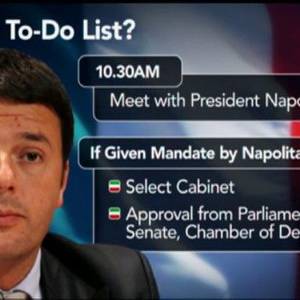A crucial vote on Senate reform—already passed in the Chamber of Deputies—may take place by mid-August. The goal of the reform bill, a hallmark of Premier Matteo Renzi’s government, is to make the Senate more distinct from Parliament in hopes of speeding up the legislative process. Ratification had been bogged down by introduction of 7,800 amendments until Wednesday, when a “kangaroo” hopped into the Senate to help save the day.
You chose: renzi
-
-
An avalanche of 7,830 amendments is hindering the much promised final vote on reform of the 315-member Italian Senate, due this week but now postponed until August or even later. The aim of the reform is to reduce in size and function what is called here the “paritary” Senate, or evil twin to the Chamber of Deputies, whose effect is to bounce legislation back and forth, yoyo fashion, blocking governance. Beyond the reform itself is the desire to show Italy and its European partners that under the leadership of Premier Matteo Renzi serious reforms are not only possible, but forthcoming.
-
With a speech in which he will announce Italy’s program for Europe, Italian Premier Matteo Renzi, 39, assumes the six-months presidency of the Council of the European Union on July 2. But even before announcing his proposed program goals, Renzi spoke movingly of the reason for the existence of a united Europe, in which Italy today, with 59.7 million people, represents both 12% of the total European population, and, with its GDP of E 1.560 billion ($2.13 billion), 12% of the European economy.
-
As European elections loom, the rhetoric heats up. But public interest remains low even though the stakes are high. In the background are the continuing recession, judiciary evidence of corruption for Expo in Milan, and the hordes of immigrants who continue to arrive, on shabby boats via Libya, and to drown. Here’s what some of the top leaders are saying or, rather, shouting during these final days before the vote May 25.
-
It's a done deal: on Wednesday the Chamber of Deputies passed a revised election law dubbed the "Italicum," with 365 votes in favor, 156 nays and 40 abstentions. The new law, whose aim is to promote governing stability in a country where the political parties are locked in a three-way split, now passes to the Senate for debate and approval. But Premier Matteo Renzi's point was also to show that he can make good on his promises to bring change.
-
The proposal for a revision of the election process finally made it into the Chamber of Deputies this week, as neo-Premier Matteo Renzi had promised, but it does not quite resemble the deal expected after he and former Premier Silvio Berlusconi had a widely publicized (and widely criticized) meeting to hash it out. In the Senate, Beppe Grillo, head of the Movimento Cinque Stelle, went on a North Korean-style warpath, casting out dissidents. New polls show center-right and center-left neck and neck, and, for Grillo, disapproval.
-
Sixteen names on the list. Half of them are women.
-
Premier designate Matteo Renzi is a man in a hurry. After being tapped by President Giorgio Napolitano on Monday, he declared that he will "go for broke" to introduce reforms and that he intends for his government to last four years, or until the natural end of the legislature. He has listed four crucial political goals, with deadlines. Most, however, are the same goals that have frustrated his predecessors in office. On entering Parliament Tuesday Renzi--who is not an MP--actually got lost and had to be shown the way. Can he help Italy find its way out of what he has called "a swamp"?
-
Speedy actin of taxation and a revision of the law governing national general elections top the new year political agenda. The hated housing tax IMU was originally applied to primary residences, and the income from it divided between the state and the local townships. But it was abolished and application of new substitute tax laws is proving chaotic. In addition, Matteo Renzi, the new head of the Partito Democratico (PD), demands revision within days, not weeks, of the "Porcellum" electoral law, declared unconstitutional last month, eight years after it was adopted.
-
Given the disaffection in the Italian electorate, not a single pundit dared to predict that two million people would turn out for Sunday's Partito Democratico (PD) primaries to elect a new general secretary. So guess what: a stunningly large number, almost three million, defied chill weather and Christmas shopping traffic jams to stand in line to vote in the 8,400 impromptu polling stations set up by volunteers all over Italy. As predicted, Matteo Renzi, the 38-year-old, fast-talking mayor of Florence since 2009, won the three-way race, but here too the surprise was that he claimed the support of over two out of three voters, or, with 1.7 million votes to his credit, almost 70%. It was, as the media here are saying, "an avalanche," "a tsunami."







































